
It’s no secret that, while it remains the world’s largest mobile handset maker, Finland’s Nokia has been struggling to find its feet in the smartphone market. Now the company is even starting to lose share amongst feature phones in developing markets. Nokia has made serious changes in its executive leadership, bringing in Canadian (and former Microsoft exec) Stephen Elop as its first non-Finnish CEO, but so far the company is still seeing its revenue and profits decline while the likes of the iPhone and Android define the profitable edge of the world’s mobile phone market.
However, in recent days Nokia’s shares have actually been rising on speculation that Nokia will announce a partnership with Microsoft to develop devices for Microsoft’s Windows Phone 7 operating system. Although industry watchers have been wondering about such a deal since Microsoft’s Elop took over the reins at Nokia, the idea was given further impetus when analyst Adnaan Ahmad of Hamburg’s Berenberg Bank urged, in an open letter (PDF) published by The Financial Times, that Nokia abandon its Symbian operating system and ink and exclusive deal with Microsoft to make Windows Phone 7 devices.
Adnaan also urges Nokia to ditch MeeGo, its open source mobile and embedded operating system that it has co-developed with Intel, describing it as “biggest joke in the tech industry right now.” Nokia is widely expected to unveil its first MeeGo devices this month at the Mobile World Congress in Barcelona.
Both Microsoft and Nokia have declined to comment on the open letter. Some industry watchers think a conversion to Windows Phone 7 would be the kind of bold move that might just be able to put Nokia back on the smartphone map, particularly in the North American market. However, many also note such a move would be unprecedented for Nokia, which, like Apple, has historically preferred to control as many aspects of its business as possible.
Nokia CEO Stephen Elop may have indirectly fueled speculation during comments to analysts at the end of January, when he indicated the company planned to set separate strategies for low-, mid-, and high-end phone businesses, and that Nokia was willing to “create and/or join other ecosystems.” Some analysts interpreted that as Nokia potentially considering making devices using Google’s Android operating system.
However, partnering with Microsoft would be a risky move for Nokia: if there’s another company that’s had as much difficulty finding success in the smartphone market as Nokia, it may be Microsoft: Windows Phone 7 is apparently still being outsold by the long-moribund Windows Mobile 6.5.
Editors' Recommendations
- I have 7 tips to help you take great pictures with your iPhone
- Nokia’s newest Android phone has an unbelievably cool feature
- Does the Google Pixel 7a have wireless charging?
- Forget gaming — there’s another big reason to buy the ROG Phone 7 Ultimate
- The Pixel 7’s best camera trick is coming to the iPhone and all Android phones